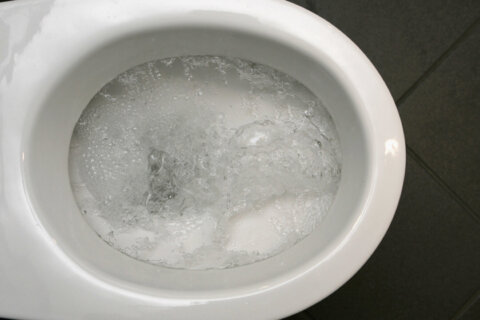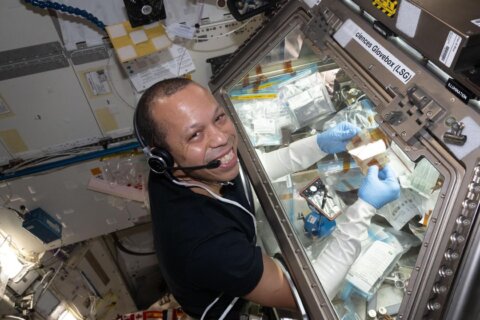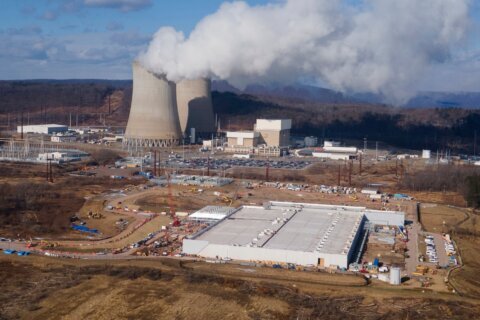This video is no longer available.
A massive $271 million project at the WSSC Water facility in Accokeek, Maryland, is nearing completion. The first of two silos overlooking Piscataway Creek is now being filled up with biosolids — but you’re much more likely to call it all “poop.” And if you ride the bus in Montgomery County, it could help you get you where you need to go.
There are still a few things left to construct, but the process has started. Last week, WSSC Water went live with this major renewable energy project when it added microorganisms to the biosolids being held there. Those microorganisms are starting to break down the waste floating around inside and will eventually turn “poop into power.”
“We allow the microorganisms to break down the food, in this case, biosolids, and that produces methane gas,” Brian Mosby, biosolids division manager at the anaerobic digestion and combined heat and power facility in Accokeek, said. “As we feed them, they grow and they grow. And as they grow over a few weeks, then they become methane producers, and that’s how we ultimately get the methane gas.”
A deal signed last year will send that gas from WSSC Water to Montgomery County, which will use it to power Ride On buses.

Eventually, both silos will be filled and start digesting the gases in a way that can be reused.
While on a tour of the facility, Mosby pointed to a series of pipes leaving the tank, which were labeled “digester gas pipe,” and he explained how they’ll take that methane to what’s called a “gas upgrading facility.”
“Our gas upgrading skid actually upgrades the gas. It removes all of the things that are not conducive for using the gas,” said Mosby. “It makes it (meet) Washington Gas utility standards. And once it meets those standards, it goes into our pipeline, and we get renewable energy credits.”
Right now, WSSC Water estimates it will generate more than $3 million in renewable energy credits every year. Some of the gas created in this process could end up being used to power the generators and equipment that make it happen, which means, eventually, the entire process could be mostly self-sustaining.
“We’re reducing our greenhouse gas. We’re reducing our carbon footprint. We’re taking gas and we’re reusing it,” said Mosby. “Our biosolids that come in here, in this anaerobic digestion process, get reduced by about 50%. So we’re hauling less biosolids, we’re saving money with fuel, and we’re saving hauling costs.”
Soon, they’ll be hauling away a lot less biosolid material. Right now, the 8,000 tons of biosolids, or poop, that gets treated by WSSC Water has to be hauled away to a site in Virginia.
However, the facility is also in the process of further treatment to make the biosolids even cleaner to the point that eventually what you flush down the toilet could be bought and used as fertilizer in your flower or vegetable garden. D.C. Water already has a similar program it says is used throughout the Mid-Atlantic region.
“If we can sell it all, we’ll sell it all,” said Mosby.
Get breaking news and daily headlines delivered to your email inbox by signing up here.
© 2024 WTOP. All Rights Reserved. This website is not intended for users located within the European Economic Area.








